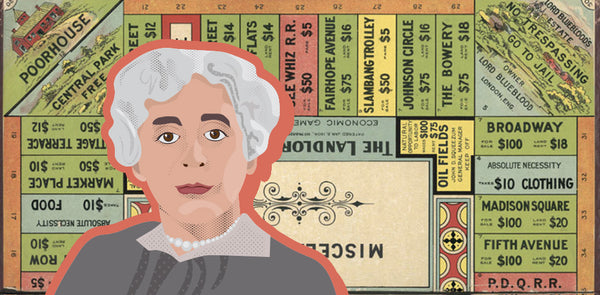
STEAM in History: Elizabeth Magie
While history has not always been a defender of women in STEM, headstrong women have always made history behind the scenes. A quick search on the famous board game Monopoly may give credit to a man named Charles Darrow. However, it is the not-so-famous Elizabeth Magie with whom the game's origins may truly lie.
Who is Elizabeth Magie?

A stenographer, engineer, writer, comedic performer, and independent homeowner until her late marriage at age 44, Elizabeth Magie was far from a typical woman in the late 19th century. Much of her work involved sharing her political beliefs with the world in unique ways. Most notably, she supported economist Henry George’s idea of a “land tax” or “single tax.” She was against wealthy individuals holding a monopoly on land, deeming it unfair to everyday Americans, especially those living in cities.
To help showcase the harmful effects of land grabbing, Magie invented The Landlord's Game. Her game featured landing spaces such as “Go to Jail'' and a “Poor House” and, unlike many other board games of the time, allowed players to circle the board. It became very popular among scholars and Quakers in the Northeast.
Magie even applied for a patent for The Landlord's Game, making her part of the 1% of all female patent applicants at that time. After several years of waiting, she did receive the patent for her game.
From The Landlord's Game to Monopoly:
Eventually, the company Parker Brothers bought the rights to the game Monopoly from a man named Charles Darrow. It is believed that Darrow had played a version of The Landlord's Game with the Quakers living in Atlantic City, NJ. These players renamed the streets to match those of their hometown and added fixed prices to each property.
Darrow made his fortune thanks to the sale of his game, receiving royalties throughout his lifetime. However, although Parker Brothers did purchase The Landlord’s Game patent, Magie only received a total income of $500 for her creation. It was not until a legal trial in the 1970s that her contributions to the game were unveiled.
Although Elizabeth’s story was lost in history for several years, she is truly a STEM superstar. Her innovative thinking paved the way for one of the greatest board games of all time.
Click for free printable posters and trading cards about Elizabeth Magie and more STEAM role models to share with your learners!
Design Your Own Board Game:
Share Elizabeth Magie’s story with learners and get them thinking like a game creator! Why not use board games as an icebreaker activity? Give this prompt a try:
Create a game that teaches others about something important to you!
Just as Magie invented a game that taught others about something she firmly believed in, your learners will love designing games that teach others all about things for which they are most passionate. The possibilities are endless!
Check out these fun resources for ideas to help you get started:
Be more than a game developer — be a programmer!
Want to bring computer programming to your learning environment? Lead learners to code and design games of their own throughout engaging, step-by-step, scaffolded lessons.
Check out these turn-key programs for ways to turn your board games into digitally-accessible creations:
More STEAM Role-Models:
Click the links below to learn about more inspiring, diverse STEAM role models:
- Blog: SHEroes of STEM
- Videos: Drone Careers: Filmmaking & Cinematography
- Webinar & Posters: Girls in STEM and the Women who Inspire Them

Author: Jessica Ventre
An experienced elementary educator and science instructional coach, Jessica’s passion for STEM instruction and student-led learning is always at the forefront of her lessons and professional development workshops.
References:
Pilon, M. (2015, February 13). Monopoly's inventor: The progressive who didn't pass 'go'. The New York Times. Retrieved June 22, 2022, from https://www.nytimes.com/2015/02/15/business/behind-monopoly-an-inventor-who-didnt-pass-go.html











